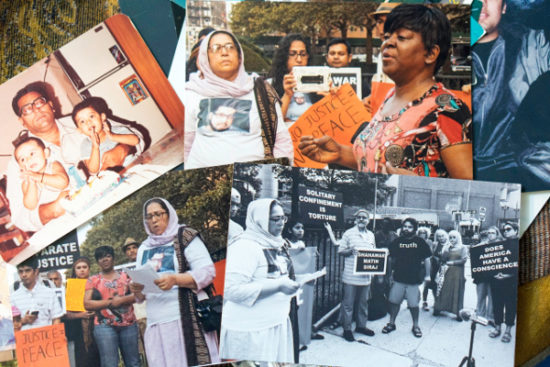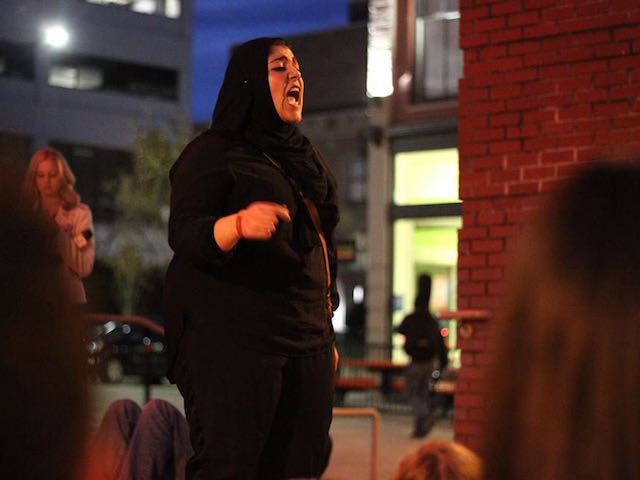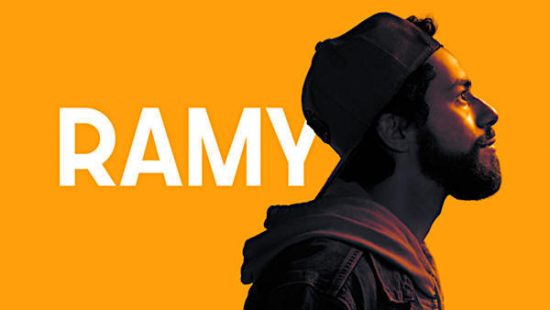How many terrorism cases against Muslim Americans were filed by the NYPD as a result of its snooping on Muslim mosques, organizations and coffee shops?
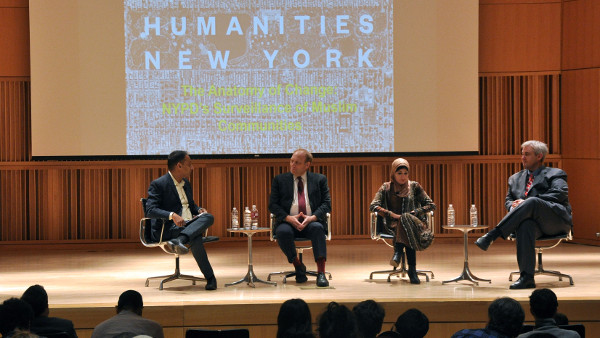
December 13, 2016
For more than six years after 9/11, the New York Police Department systematically spied on Muslim Americans for over six years. And despite all the “spying on Muslim neighborhoods, eavesdropping on conversations and cataloguing mosques (In New York and New Jersey), the NYPD’s secret demographics unit never generated a lead or triggered a terrorism investigation.”
It was in 2011 when the Associated Press started coming out with a series on the NYPD’s clandestine spying program against the city’s Muslim communities. This series won for AP the 2012 Pulitzer Prize for Investigative Reporting.
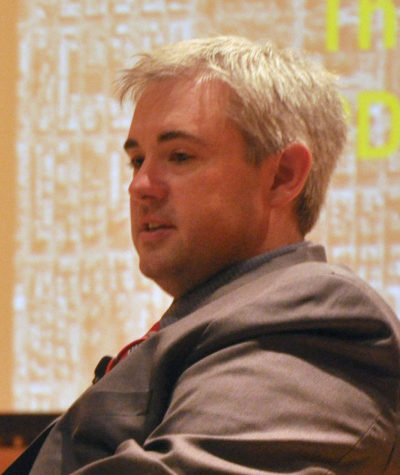
“I don’t pretend to know what it is like to grow up Arab American or Muslim. But I can listen,” Matt Apuzzo, one of the four reporters who wrote the prize-winning series, said during a lively two-hour discussion about the AP series and about the impact of the NYPD surveillance of Muslim communities.
Apuzzo shared the stage at the City University of New York’s Graduate Center on a frigid evening in late October with three others: writer and academic Moustafa Bayoumi; prominent Arab American activist Linda Sarsour; and Apuzzo’s former editor at the AP, Michael Oreskes. The event, according to its organizer, Humanities New York, was to showcase “well-funded, investigative, special-project reporting” especially relevant in an election year that has seen “incredible and damaging political and cultural polarization.”
From August to December in 2011, the AP team wrote stories on how the NYPD monitored daily life in the city’s Muslim communities. The team wrote about how the NYPD spied on 250-plus mosques and student groups, how it kept an eye even on U.S. citizens, and how it snooped on anti-terror partners and allies.
The NYPD’s secret demographics unit, however, admitted in a 2012 deposition that despite six years of snooping, it “ has not commenced an investigation.”
The demographics unit, the existence of which the NYPD vehemently denied before the AP published the initial story, was built with the help of the CIA. It assembled databases on where Muslims lived, shopped, worked and prayed. “Police infiltrated Muslim student groups, put informants in mosques, monitored sermons and catalogued every Muslim in New York who adopted new, Americanized surnames,” one of the stories read.
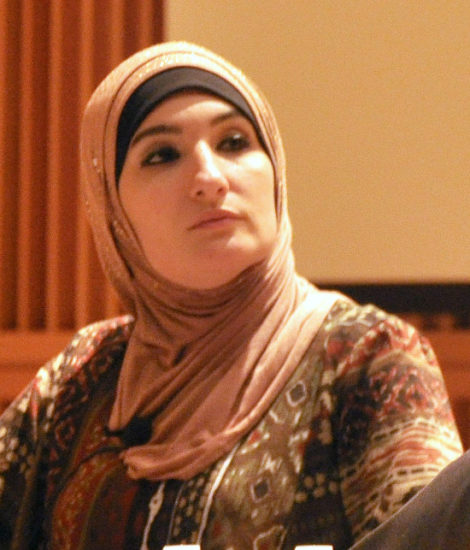
But for the Muslim communities, the investigative reports that rolled out in 2011 and 2012 were “confirmations” rather than “revelations.” “We already knew that we were under unwarranted surveillance by the NYPD, but people engaged in conversation about whether we were paranoid versus ‘was this actually the reality of being a Muslim in New York City?’” Sarsour said.
“The difference between a policy like stop-and -risk in which you are physically stopping people on the street as opposed to spying on people is something hard to prove. It was always an uphill battle for us as a community to advocate on our behalf, since we haven’t figured out how to make surveillance and actual human surveillance a human rights issue,” she added.
It was shocking to activists like Sarsour that this was happening despite Arab American and Muslim organizations earnestly engaging the NYPD through effective relationships: inviting them to the front door, bringing them to the mosque to talk to leaders and engaging them in community activities including a soccer league.
“For me, these reports were an opportunity to start a conversation in our own community,” she said. “Not only did we confirm that the NYPD was engaging in unwanted surveillance not based on any criminal leads, but that the actual intelligence on which they were working with were often based on inaccurate comments from informants. That fact that it was based on misinformation scared me more,” Sarsour said.
“’Police infiltrated Muslim student groups, put informants in mosques, monitored sermons and catalogued every Muslim in New York who adopted new, Americanized surnames,’ one of the stories read.”
Apuzzo had spoken earlier in the evening about the history of such intelligence gathering, pointing out that during the ‘Red Scare days’ in New York, there were active monitoring systems to keep tabs on student groups, anti-Vietnam war activists, pacifists groups, black radicals and anyone else who threatened the status quo at the time. Yet, a lawsuit, which became known as the Handschu Decree, resulted in federal guidelines that prohibited the NYPD from collecting information about political speech unless it is related to potential terrorism.
“Then 9/11 happened and the NYPD went to the courts and said ‘we can’t live with this kind of oversight, waiting until the bomb goes off to investigate. We can’t wait for evidence of crime before we start gathering intelligence on people.’ The judge agreed with that analysis,” said Apuzzo.
“Then a funny thing happened after that. Nobody asked: ‘what are you going to do with that power?’ And there were very little news stories that addressed what the NYPD was doing with this new authority. They stripped the outside reviewer and all the power was centralized with the intelligence division and there was not much of news coverage about it,” Apuzzo said.
A lot of what the AP wrote about was “growing pains of starting an intelligence unit on the back of a napkin where the oversight was essentially gutted,” Apuzzo said.
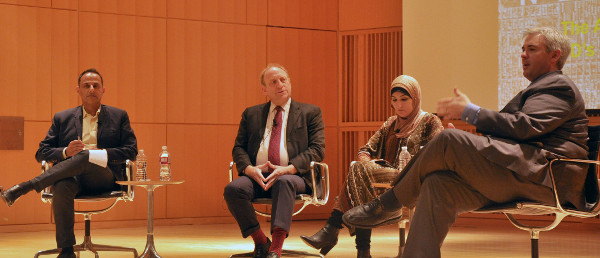
So the AP team sort of stumbled upon the NYPD’s surveillance, where teams of officers would hang out in coffee shops and sheesha joints, listening to conversations, taking notes on what people thought about politics and the state of the union, where people bought their groceries, putting informants in mosques and taping sermons.
“For a little while, we assumed someone would be writing about this. This is the largest city in the country and this is the largest police department in the country,” Apuzzo said. “I think it sort of became an article of faith after 9/11 that we needed to give the police department and the government this sort of authority, and nobody went back and checked what were they doing with that. I hope that we started a conversation about that.”
It did not just trigger a conversation but it served as a “tool” that Muslim communities used for advocacy. “It was a tool that we were able to use as a community that could then go into major policy changes in New York City, which included the creation of the first Inspector-General,” said Sarsour. The Inspector-General’s office had recently said that of the sampling of cases that they saw, 95 percent of the cases were related to Muslims or Islam with some kind of professional negligence on the part of the police department.
“’It looks like people are willing to trade off someone else’s security for their liberty. That’s a more complex question,’ said Bayoumi, who moderated the discussion. ‘They knew where New York’s Muslims were and not where the terrorists were.'”
“Nobody was listening to us and sometimes even our allies weren’t sure. So we were able to use the AP reports to say, ‘see, everything we have been telling you so far has actually been happening.’ That really helped amplify the coalition in New York that also helped expand the protected category in the anti-racial profiling bill,” she said, pointing out that both religion and national origin had not been deemed as protected categories.
“It also helped us understand what we still don’t know…I don’t know if the NYPD is engaging in the same type of unwarranted surveillance still,” Sarsour added
While the panelists spoke about what sparked outrage among New Yorkers over such revelations, the question was over the trade-off between liberty and security. “It looks like people are willing to trade off someone else’s security for their liberty. That’s a more complex question,” said Bayoumi, who moderated the discussion.
“They knew where New York’s Muslims were and not where the terrorists were,” Bayoumi said.

